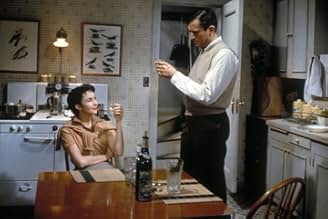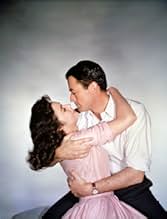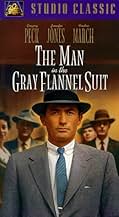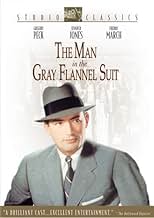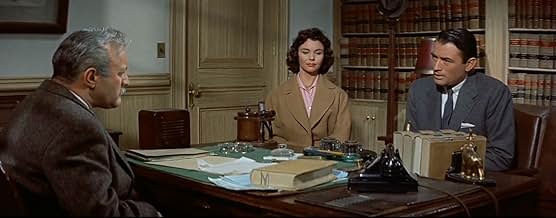CALIFICACIÓN DE IMDb
7.1/10
4.4 k
TU CALIFICACIÓN
Un exsoldado se enfrenta a cuestiones éticas cuando trata de ganar lo suficiente para mantener a su esposa e hijos.Un exsoldado se enfrenta a cuestiones éticas cuando trata de ganar lo suficiente para mantener a su esposa e hijos.Un exsoldado se enfrenta a cuestiones éticas cuando trata de ganar lo suficiente para mantener a su esposa e hijos.
- Dirección
- Guionistas
- Elenco
- Premios
- 1 premio ganado y 3 nominaciones en total
Tristram Coffin
- Byron Holgate
- (escenas eliminadas)
William 'Bill' Phillips
- Antonio Bulaga
- (escenas eliminadas)
- Dirección
- Guionistas
- Todo el elenco y el equipo
- Producción, taquilla y más en IMDbPro
Opiniones destacadas
A man, feeling pressure from his wife for a better lifestyle, takes a new job with increased pay but added stress. To make matters worse, he becomes embroiled in legal actions concerning an inheritance from his grandmother. On top of all this, he learns that some of his actions in Italy during World War 2 have come to haunt him. This is a well told story with many sides to it, and I feel the use of flashback went a long way in making it even better. Well worth seeing.
I had trouble finding this film in the local video store but finally saw it on television. It's well worth watching. It's a wonderful commentary on the American suburban corporate culture emerging in the years following the second World War. Peck plays the stereotypical businessman living in Connecticut and taking the New Haven Railroad into New York City each day. He is faced with a number of seemingly mundane dilemmas, such as settling a deceased relative's estate, how to deal with a dissatisfied wife more ambitious than he, whether to switch jobs for better pay, and whether he should tell his new boss what he *needs* rather than *wants* to hear. Hanging over him are the ever-present memories of his wartime combat experience, which intrude on him occasionally especially during those otherwise empty hours spent commuting on the train.
I disagree with the reviewer who found the film boring apart from the war scenes. One of the reasons why this film works so well is that it regularly jolts the viewer, nearly lulled into complacency by the apparent ordinariness of suburban life, with those sudden flashbacks of the horrors of war. The juxtaposition of these quite different scenes was quite deliberate and speaks volumes in itself. How is it possible for someone who has spent four years both killing and avoiding death to settle into a normal life of family and work? Obviously it's not easy.
Furthermore, death continues to haunt the family in various, almost light-hearted ways, particularly by way of the children who were born after the carnage had ended and for whom death is no more real than the gunfights in those television westerns to which they are so conspicuously addicted. A scene near the beginning has one of the girls suffering from chicken pox, a fairly minor malady, as everyone knows. But she tells her father she has "small pox" and her sister keeps teasing her with the morbid suggestion that she is going to die. The father tells her to stop, but she keeps it up. He knows what death is all about; his children do not.
The term "workaholic" had not yet been coined in 1956, but the contrast between the man who chooses a fuller, less driven life including time for family and the man married to his career could not have been more starkly portrayed. The viewers find themselves applauding the choice Peck eventually makes and pitying March for not having done so himself.
I am a great fan of the score's composer, Bernard Herrmann, whose music is uniquely capable of evoking a range of strong emotions in the listener. The music here is typically Herrmann, although it is not as central a "character" in this film as are his scores in, say, "Vertigo" and "Psycho." It is impossible to imagine the latter two films without the music, while this film seems less obviously dependent on its score.
Although I quite liked this film, it is overly long and could have been better edited. The several subplots needed to be better integrated into the whole. What, for example, was the purpose of the challenge to Peck's inheritance, other than to show the persistent salvific role Cobb played in his life? This subplot could easily have been cut and the film would have suffered nothing in terms of its overall impact. In fact, it might have been better for being more tightly constructed.
I disagree with the reviewer who found the film boring apart from the war scenes. One of the reasons why this film works so well is that it regularly jolts the viewer, nearly lulled into complacency by the apparent ordinariness of suburban life, with those sudden flashbacks of the horrors of war. The juxtaposition of these quite different scenes was quite deliberate and speaks volumes in itself. How is it possible for someone who has spent four years both killing and avoiding death to settle into a normal life of family and work? Obviously it's not easy.
Furthermore, death continues to haunt the family in various, almost light-hearted ways, particularly by way of the children who were born after the carnage had ended and for whom death is no more real than the gunfights in those television westerns to which they are so conspicuously addicted. A scene near the beginning has one of the girls suffering from chicken pox, a fairly minor malady, as everyone knows. But she tells her father she has "small pox" and her sister keeps teasing her with the morbid suggestion that she is going to die. The father tells her to stop, but she keeps it up. He knows what death is all about; his children do not.
The term "workaholic" had not yet been coined in 1956, but the contrast between the man who chooses a fuller, less driven life including time for family and the man married to his career could not have been more starkly portrayed. The viewers find themselves applauding the choice Peck eventually makes and pitying March for not having done so himself.
I am a great fan of the score's composer, Bernard Herrmann, whose music is uniquely capable of evoking a range of strong emotions in the listener. The music here is typically Herrmann, although it is not as central a "character" in this film as are his scores in, say, "Vertigo" and "Psycho." It is impossible to imagine the latter two films without the music, while this film seems less obviously dependent on its score.
Although I quite liked this film, it is overly long and could have been better edited. The several subplots needed to be better integrated into the whole. What, for example, was the purpose of the challenge to Peck's inheritance, other than to show the persistent salvific role Cobb played in his life? This subplot could easily have been cut and the film would have suffered nothing in terms of its overall impact. In fact, it might have been better for being more tightly constructed.
In Connecticut, the former WWII officer Tom Rath (Gregory Peck) and his wife Betsy (Jennifer Jones) are happily married middle class couple with three children. However, they have financial difficulties and Tom commutes every day to Manhattan to work in a charitable organization receiving a low salary.
Tom is tormented by the traumatic experience in war, where he killed seventeen persons including a young German soldier and he occasionally recalls his love affair with the Italian Maria (Marisa Pavan) in 1945.
When Tom inherits his grandmother's house, her former servant claims the real state but using forged document. Meanwhile Tom is hired to work as public relation of a television network and is assigned to write a speech to the owner, Ralph Hopkins (Frederic March). Soon he needs to decide whether he will be a dedicated executive or 9 to 5 fellows. Further, he learns that he has a son with Maria and she is very needy and he needs to choose between telling the truth to Betsy or keep the secret.
"The Man in the Gray Flannel Suit" is a realistic and humanistic drama about choices of an insecure man with a war trauma that frequently haunts him. Tom Rath sometimes is reluctant, thinking in the safety of his family first, but always takes the right decision supported by his beloved wife Betsy. The story has many subplots and one memorable character, Judge Bernstein, performed by Lee J. Cobb. The story is long but never boring. My vote is seven.
Title (Brazil): "Homem do Terno Cinzento" ("Man in the Gray Suit")
Tom is tormented by the traumatic experience in war, where he killed seventeen persons including a young German soldier and he occasionally recalls his love affair with the Italian Maria (Marisa Pavan) in 1945.
When Tom inherits his grandmother's house, her former servant claims the real state but using forged document. Meanwhile Tom is hired to work as public relation of a television network and is assigned to write a speech to the owner, Ralph Hopkins (Frederic March). Soon he needs to decide whether he will be a dedicated executive or 9 to 5 fellows. Further, he learns that he has a son with Maria and she is very needy and he needs to choose between telling the truth to Betsy or keep the secret.
"The Man in the Gray Flannel Suit" is a realistic and humanistic drama about choices of an insecure man with a war trauma that frequently haunts him. Tom Rath sometimes is reluctant, thinking in the safety of his family first, but always takes the right decision supported by his beloved wife Betsy. The story has many subplots and one memorable character, Judge Bernstein, performed by Lee J. Cobb. The story is long but never boring. My vote is seven.
Title (Brazil): "Homem do Terno Cinzento" ("Man in the Gray Suit")
This movie from the 1950's goes beyond the conflict in balancing home and work commitments because it also deals with the loss of idealism by young people who become caught up with the need to provide and the competition to succeed. Life seems to have gotten worse in the 60 years since this movie was made. In fact, some people, both men and women, have given up on the idea of family life in favour of success in the business world. One can only guess at the level of social dysfunction from our addictive and artificial work environments. In this movie, directed by Nunnally Johnson, a cast of exceptional acting talent provides great entertainment as well as an insight into the shallow lives that many people began to lead in the 1950's. Jennifer Jones signals her dissatisfaction with her husband's work ethic. This at first struck me as a yearning for a lost youth, wanting her husband Gregory Peck to provide for his family while keeping his knight in shining armour image. But Jones is no status seeker; she senses the boring conventional work world that her husband inhabits is not healthy for him or the family. Fredric March, that icon of American integrity, is the company Chairman. On the surface, he pays lip service to family values but struggles with his own estrangement from his wife and a daughter's elopement. Peck learns from March as a mentor but also in his failings as a man. Lee J. Cobb has a supporting role as judge and family friend. Towards the end of the movie, after some setbacks, Peck and Jones take a courageous step together that shows their own integrity and their maturity as a couple. The movie is a another landmark for the World War II generation who came back to civilian life and encountered a new world. It is one worth watching!
This film is based upon an original screenplay by Nunnally Johnson, famous for his scintillating screenplays for THE MUDLARK (1950), MY COUSIN RACHEL (1952), and THE THREE FACES OF EVE (1957). The story must have had a great deal of personal importance for him, because he chose to direct it (it was one of 8 films which he directed between 1954 and 1960). However, Johnson was not a great director, he was somewhat uninspired in that department and had few dynamic camera angles or sense of how to heighten drama visually, and in my opinion, he became too close to this story and material, so that he lost perspective to a certain extent. The film made a big hit when it came out, largely because Gregory Peck was the star. But the film addressed a number of pressing social and moral themes in a direct and sometimes brutal manner, which was unusual for the fifties. And some of them are timeless, such as Peck's despairing comment about his wartime exploits as a Captain of a Parachute division: 'I killed seventeen men. Not people in the distance, but men I could look at and see, including a young soldier whom I stabbed to death so that I could take his coat.' By addressing the issue of the traumas of the returned soldiers, haunting them still ten years after the end of the War, this film was very topical, and touched on the very themes which lay at the bottom of all the American film noir of the late forties and the fifties. Another reason for the interest in the film at the time was because of the unusual treatment of Peck being employed in the newly created television industry, a job you went to in Manhattan in a suit which was, often, grey flannel (hence the title). Jennifer Jones plays Peck's wife. Her role is surprisingly small, but most of it consists of her doing hysteria with tormented and streaming eyes, in the way she always did so well. Her husband Daryll Zanuck produced the film. There are good supporting roles for Lee J. Cobb, Keenan Wynn. Arthur O'Connell, Henry Daniell, and Gigi Perreau. (James Mason's daughter Portland Mason appears as Peck's daughter, but has little to do.) The Italian actress Marisa Pavan is excellent during a flashback section of the film as the sweet Italian girl with whom Peck has a love affair in Rome in 1945. She was the twin sister of the actress known as Pier Angeli (their real surname being Pierangeli). They both specialized in being the innocent Italian girl with the big trusting eyes who was capable of a great love, and there are some Italian girls who really look like that and really are like that, though less now than formerly. There is a third sister as well, Patrizia Pierangeli, 15 years younger than the twins, who appeared in eight films between 1972 and 1985. The other major role in the film is played with his usual dignity and thoughtfulness by Frederic March, as the rich head of a broadcasting corporation who hires Peck and whose arid and troubled private life is a major part of the story as well. (The major theme there is his sacrifice of a personal and family life in order to become a business moghul.) This film sprawls both in time and in space. Numerous major plot issues are walked away from at the end of the film and left entirely without any resolution. It is as if Johnson really needed a TV mini-series to get his complex stories told properly, and just had to cut it short. As it is, the film is a mammoth 2 hours and 33 minutes long. I would say that this was a well-meaning and deeply-felt project which partially failed, but its partial success is worthwhile. After all, films with a message are never that common at the best of times, and this was in the fifties era when so many issues were dodged by the social hypocrisies of the time. Congratulations, therefore, to Nunnally Johnson's ghost, for having tried very hard indeed to get serious about matters which were just not faced back then.
¿Sabías que…?
- TriviaOne of Gregory Peck's movie children was played by Portland Mason, who was the daughter of actor James Mason, and an Italian delivery boy was played by Johnny Crawford a few years before he would achieve fame on the popular TV Western, El hombre del rifle (1958).
- ErroresIt is believed by some that Tom shifting his car into reverse then driving away forward at the end of the film is a goof. However, the car is a manual transmission Ford with a column-shifted 3 speed manual transmission with an unsynchronized first gear. A quirk of that style transmission is that at a standing stop, getting the transmission into 1st gear when the engine is running is easiest if the operator first abruptly lifts the shift lever from neutral to place the transmission into second gear, then back down into first. This prevents clash (grinding) of the unsynchronized first gear. Drivers of the era, including Tom Rath, would have been well familiar with this technique.
- Citas
Tom Rath: I don't know anything about public relations.
Bill Hawthorne: Who does? You've got a clean shirt and you bathe every day. That's all there is to it.
- Créditos curiososOnce it fades in, the 20th Century Fox logo (set to the film's dramatic opening credits music, rather than the traditional Fox fanfare) appears in a slightly smaller CinemaScope windowbox, slowly panning to normal size (correctly fitting the CinemaScope screen) before fadeout.
- ConexionesFeatured in The Fifties (1997)
- Bandas sonoras(I'm a) Ramblin' Wreck from Georgia Tech
(1908) (uncredited)
Lyrics by Billy Walthall
Music by Frank Roman and Mike Greenblatt
based on "Son of a Gambolier"
Music by Charles Ives (1895)
Played on the ukulele by Gregory Peck
Selecciones populares
Inicia sesión para calificar y agrega a la lista de videos para obtener recomendaciones personalizadas
- How long is The Man in the Gray Flannel Suit?Con tecnología de Alexa
Detalles
- Fecha de lanzamiento
- País de origen
- Sitio oficial
- Idiomas
- También se conoce como
- The Man in the Gray Flannel Suit
- Locaciones de filmación
- Productora
- Ver más créditos de la compañía en IMDbPro
Taquilla
- Presupuesto
- USD 2,670,000 (estimado)
- Tiempo de ejecución
- 2h 33min(153 min)
- Color
- Relación de aspecto
- 2.55 : 1
Contribuir a esta página
Sugiere una edición o agrega el contenido que falta


